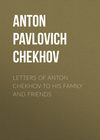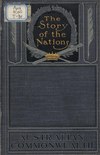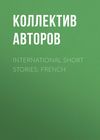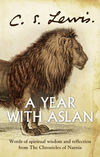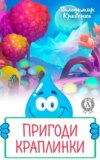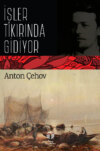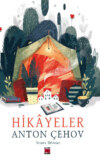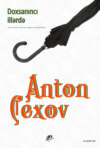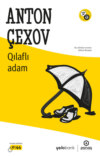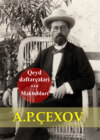Kitabı oku: «Letters of Anton Chekhov to His Family and Friends», sayfa 15
TO A. S. SUVORIN
MALAYA DMITROVKA, MOSCOW, December 9.
… Hurrah! Here at last I am sitting at my table at home! I pray to my faded penates and write to you. I have now a happy feeling as though I had not been away from home at all. I am well and thriving to the marrow of my bones. Here’s a very brief report for you. I was in Sahalin not two months, as you have printed, but three months plus two days. I worked at high pressure. I made a full and minute census of the whole of Sahalin’s population, and saw everything except the death penalty. When we see each other I will show you a whole trunkful of stuff about the convicts which is very valuable as raw material. I know a very great deal now, but I have brought away a horrid feeling. While I was staying in Sahalin, I only had a bitter feeling in my inside as though from rancid butter; and now, as I remember it, Sahalin seems to me a perfect hell. For two months I worked intensely, putting my back into it; in the third month I began to feel ill from the bitterness I have spoken of, from boredom, and the thought that the cholera would come from Vladivostok to Sahalin, and that so I was in danger of having to winter in the convict settlement. But, thank God! the cholera ceased, and on the 13th of October the steamer bore me away from Sahalin. I have been in Vladivostok. About the Primorsky Region and our Eastern sea-coast with its fleets, its problems, and its Pacific dreams altogether, I have only one thing to tell of: its crying poverty! Poverty, ignorance, and worthlessness, that might drive one to despair. One honest man for ninety-nine thieves, that are blackening the name of Russia… We passed Japan because the cholera was there, and so I have not bought you anything Japanese, and the five hundred you gave me for your purchases I have spent on my own needs, for which you have, by law, the right to send me to a settlement in Siberia. The first foreign port we reached was Hong Kong. It is an exquisite bay. The traffic on the sea was such as I had never seen before even in pictures; excellent roads, trams, a railway to the mountains, a museum, botanical gardens; wherever you look you see the tenderest solicitude on the part of the English for the men in their service; there is even a club for the sailors. I went about in a jinrickshaw – that is, carried by men – bought all sorts of rubbish of the Chinese, and was moved to indignation at hearing my Russian fellow-travellers abuse the English for exploiting the natives. I thought: Yes, the English exploit the Chinese, the Sepoys, the Hindoos, but they do give them roads, aqueducts, museums, Christianity, and what do you give them?
When we left Hong Kong the boat began to rock. The steamer was empty and lurched through an angle of thirty-eight degrees, so that we were afraid it would upset. I am not subject to sea-sickness: that discovery was very agreeable to me. On the way to Singapore we threw two corpses into the sea. When one sees a dead man, wrapped in sailcloth, fly, turning somersaults in the water, and remembers that it is several miles to the bottom, one feels frightened, and for some reason begins to fancy that one will die oneself and will be thrown into the sea. Our horned cattle have fallen sick. Through the united verdict of Dr. Stcherbak and your humble servant, the cattle have been killed and thrown into the sea.
I have no clear memory of Singapore as, for some reason, I felt very sad while I was driving about it, and was almost weeping. Next after it comes Ceylon – an earthly Paradise. There in that Paradise I went more than a hundred versts on the railway and gazed at palm forests and bronze women to my heart’s content… After Ceylon we sailed for thirteen days and nights without stopping and were all stupid from boredom. I bear the heat well. The Red Sea is depressing; I felt touched as I gazed at Sinai.
God’s world is a good place. The one thing not good in it is we. How little justice and humility there is in us. How little we understand true patriotism! A drunken, broken-down debauchee of a husband loves his wife and children, but of what use is that love? We, so we are told in our own newspapers, love our great motherland, but how does that love express itself? Instead of knowledge – insolence and immeasurable conceit; instead of work – sloth and swinishness; there is no justice, the conception of honour does not go beyond “the honour of the uniform” – the uniform which is so commonly seen adorning the prisoner’s dock in our courts. Work is what is wanted, and the rest can go to the devil. First of all we must be just, and all the rest will be added unto us,
I have a passionate desire to talk to you. My soul is in a ferment. I want no one else but you, for it is only with you I can talk.
How glad I am that everything was managed without Galkin-Vrasskoy’s help. He didn’t write one line about me, and I turned up in Sahalin utterly unknown.
MOSCOW,
December 24, 1890.
I believe in Koch and in spermine and praise God for it. All that – that is the kochines, spermines, and so on – seem to the public a kind of miracle that leaped forth from some brain, after the fashion of Pallas Athene; but people who have a closer acquaintance with the facts know that they are only the natural sequel of what has been done during the last twenty years. A great deal has been done, my dear fellow! Surgery alone has done so much that one is fairly dumbfoundered at it. To one who is studying medicine now, the time before twenty years ago seems simply pitiable. My dear friend, if I were offered the choice between the “ideals” of the renowned “sixties,” or the very poorest Zemstvo hospital of to-day, I should, without a moment’s hesitation, choose the second.
Will kochine cure syphilis? It’s possible. But as for cancer, you must allow me to have my doubts. Cancer is not a microbe; it’s a tissue, growing in the wrong place, and like a noxious weed smothering all the neighbouring tissues. If N.‘s uncle feels better, that is, because the microbes of erysipelas – that is, the elements that produce the disease of erysipelas – form a component part of kochine. It was observed long ago that with the development of erysipelas, the growth of malignant tumours is temporarily checked.
It’s a strange business – while I was travelling to Sahalin and back I felt perfectly well, but now, at home, the devil knows what is happening to me. My head is continually aching, I have a feeling of languor all over, I am quickly exhausted, apathetic, and worst of all, my heart is not beating regularly. My heart is continually stopping for a few seconds…
MOSCOW,
January, 1891.
I shall probably come to Petersburg on the 8th of January… Since by February I shall not have a farthing, I must make haste and finish the novel [Footnote: “The Duel.”] I’ve begun. There is something in the novel about which I must talk to you and ask your advice.
I spent Christmas in a horrible way. To begin with, I had palpitations of the heart; secondly, my brother Ivan came to stay and was ill with typhoid, poor fellow; thirdly, after my Sahalin labours and the tropics, my Moscow life seems to me now so petty, so bourgeois, and so dull, that I feel ready to bite; fourthly, working for my daily bread prevents my giving up my time to Sahalin; fifthly, my acquaintances bother me, and so on.
The poet Merezhkovsky has been to see me twice; he is a very intelligent man.
How sorry I am you did not see my mongoose. It is a wonderful creature.
TO HIS SISTER
ST. PETERSBURG, January 14, 1891.
Unforeseen circumstances have kept me a few days longer. I am alive and well. There is no news. I saw Tolstoy’s “The Power of Darkness” the other day, though. I have been to Ryepin’s studio. What else? Nothing else. It’s dull, in fact.
I went to-day to a dog-show; I went there with Suvorin, who at the moment I am writing these lines is standing by the table and asking me to write and tell you that I have been to the dog-show with the famous dog Suvorin…
January, later
I am alive and well, I have no palpitations, I’ve no money either, and everything is going well.
I am paying visits and seeing acquaintances. I have to talk about Sahalin and India. It’s horribly boring.
… Anna Ivanovna is as nice as ever, Suvorin talks as incessantly as ever.
I receive the most boring invitations to the most boring dinners. It seems I must make haste and get back to Moscow, as they won’t let me work here.
Hurrah, we are avenged! To make up for our being so bored, the cotton ball has yielded 1,500 roubles clear profit, in confirmation of which I enclose a cutting from a newspaper.
If anything is collected for the benefit of the Sahalin schools, let me know at once.
How is my mongoose? Don’t forget to give him food and drink, and beat him without mercy when he jumps on the table. Does he eat people? [Footnote: A naive question asked by a lady of Chekhov’s acquaintance.]
Write how Ivan is…
January, later
I am tired as a ballet dancer after five acts and eight tableaux. Dinners, letters which I am too lazy to answer, conversations and imbecilities of all sorts. I have to go immediately to dine in Vassilyevsky Ostrov, and I am bored and ought to work.
I’ll stay another three days and see whether the ballet will go on the same, then I shall go home, or to see Ivan.
I am surrounded by a thick atmosphere of ill-feeling, extremely vague and to me incomprehensible. They feed me with dinners and pay me the vulgarest compliments, and at the same time they are ready to devour me. What for? The devil only knows. If I were to shoot myself I should thereby provide the greatest gratification to nine-tenths of my friends and admirers. And how pettily they express their petty feelings!
… My greetings to Lydia Yegorovna Mizinov. I expect a programme from her. Tell her not to eat farinaceous food and to avoid Levitan. A better admirer than me she will not find in her Town Council nor in higher society.
January 16, 1891
I have the honour to congratulate you and the hero of the name-day; [Footnote: It was the name-day of Chekhov himself.] I wish you and him health and prosperity, and above all that the mongoose should not break the crockery or tear the wall-paper. I shall celebrate my name-day at the Maly Yaroslavets restaurant, from the restaurant to the benefit performance, from the benefit performance to the restaurant again.
I am working, but with very great difficulty. No sooner have I written a line than the bell rings and someone comes in to talk to me about Sahalin. It’s simply awful! …
I have found Drishka. It appears that she is living in the same house as I am. She ran away from Moscow to Petersburg under romantic circumstances: she meant to marry a lawyer, plighted her troth to him, but an army captain turned up, and so on; she had to run away or the lawyer would have shot both Drishka and the captain with a pistol loaded with cranberries. She is prospering and is the same lively rogue as ever. I went to Svobodin’s name-day party with her yesterday. She sang gipsy songs, and created such a sensation that all the great men kissed her hand.
Rumours have reached me that Lidia Stahievna is going to be married par depit. Is it true? Tell her that I shall carry her off from her husband par depit. I am a violent man.
Has not anything been collected for the benefit of the Sahalin schools? Let me know…
TO A. F. KONI
PETERSBURG, January 16, 1891.
DEAR SIR, ANATOLY FYODOROVITCH,
I did not hasten to answer your letter because I am not leaving Petersburg before next Saturday. I am sorry I have not been to see Madame Naryshkin, but I think I had better defer my visit till my book has come out, when I shall be able to turn more freely to the material I have. My brief Sahalin past looms so immense in my imagination that when I want to speak about it I don’t know where to begin, and it always seems to me that I have not said what was wanted.
I will try and describe minutely the position of the children and young people in Sahalin. It is exceptional. I saw starving children, I saw girls of thirteen prostitutes, girls of fifteen with child. Girls begin to live by prostitution from twelve years old, sometimes before menstruation has begun. Church and school exist only on paper, the children are educated by their environment and the convict surroundings. Among other things I have noted down a conversation with a boy of ten years old. I was making the census of the settlement of Upper Armudano; all the inhabitants are poverty-stricken, every one of them, and have the reputation of being desperate gamblers at the game of shtoss. I go into a hut; the people are not at home; on a bench sits a white-haired, round-shouldered, bare-footed boy; he seems lost in thought. We begin to talk.
I. “What is your father’s second name?”
He. “I don’t know.”
I. “How is that? You live with your father and don’t know what his name is? Shame!”
He. “He is not my real father.”
I. “How is that?”
He. “He is living with mother.”
I. “Is your mother married or a widow?”
He. “A widow. She followed her husband here.”
I. “What has become of her husband, then?”
He. “She killed him.”
I. “Do you remember your father?”
He. “No, I don’t, I am illegitimate. I was born when mother was at Kara.”
On the Amur steamer going to Sahalin, there was a convict with fetters on his legs who had murdered his wife. His daughter, a little girl of six, was with him. I noticed wherever the convict moved the little girl scrambled after him, holding on to his fetters. At night the child slept with the convicts and soldiers all in a heap together. I remember I was at a funeral in Sahalin. Beside the newly dug grave stood four convict bearers ex officio; the treasury clerk and I, in the capacity of Hamlet and Horatio, wandering about the cemetery; the dead woman’s lodger, a Circassian, who had come because he had nothing better to do; and a convict woman who had come out of pity and had brought the dead woman’s two children, one a baby, and the other, Alyoshka, a boy of four, wearing a woman’s jacket and blue breeches with bright-coloured patches on the knees. It was cold and damp, there was water in the grave, the convicts were laughing. The sea was in sight. Alyoshka looked into the grave with curiosity; he tried to wipe his chilly nose, but the long sleeve of his jacket got into his way. When they began to fill in the grave I asked him: “Alyoshka, where is your mother?” He waved his hand with the air of a gentleman who has lost at cards, laughed, and said: “They have buried her!”
The convicts laughed, the Circassian turned and asked what he was to do with the children, saying it was not his duty to feed them.
Infectious diseases I did not meet with in Sahalin. There is very little congenital syphilis, but I saw blind children, filthy, covered with eruptions – all diseases that are evidence of neglect. Of course I am not going to settle the problem of the children. I don’t know what ought to be done. But it seems to me that one will do nothing by means of philanthropy and what little is left of prison and other funds. To my thinking, to make something of great importance dependent upon charity, which in Russia always has a casual character, and on funds which do not exist, is pernicious. I should prefer it to be financed out of the government treasury.
TO A. S. SUVORIN
MOSCOW, January 31, 1891.
At home I found depression. My nicest and most intelligent mongoose had fallen ill and was lying very quietly under a quilt. The little beast eats and drinks nothing. The climate has already laid its cold claw on it and means to kill it. What for?
We have received a dismal letter. In Taganrog we were on friendly terms with a well-to-do Polish family. The cakes and jam I ate in their house when I was a boy at school arouse in me now the most touching reminiscences; there used to be music, young ladies, home-made liqueurs, and catching goldfinches in the immense courtyard. The father had a post in the Taganrog customs and got into trouble. The investigation and trial ruined the family. There were two daughters and a son. When the elder daughter married a rascal of a Greek, the family took an orphan girl into the house to bring up. This little girl was attacked by disease of the knee and they amputated the leg. Then the son died of consumption, a medical student in his fourth year, an excellent fellow, a perfect Hercules, the hope of the family… Then came terrible poverty… The father took to wandering about the cemetery, longed to take to drink but could not: vodka simply made his head ache cruelly while his thoughts remained the same, just as sober and revolting. Now they write that the younger daughter, a beautiful, plump young girl, is consumptive… The father writes to me of that and writes to me for a loan of ten roubles… Ach!
I felt awfully unwilling to leave you, but still I am glad I did not remain another day – I went away and showed that I had strength of will. I am writing already. By the time you come to Moscow my novel [Footnote: “The Duel.”] will be finished, and I will go back with you to Petersburg.
Tell Borya, Mitya, and Andrushka that I vituperate them. In the pocket of my greatcoat I found some notes on which was scrawled: “Anton Pavlovitch, for shame, for shame, for shame!” O pessimi discipuli! Utinam vos lupus devoret!
Last night I did not sleep, and I read through my “Motley Tales” for the second edition. I threw out about twenty stories.
MOSCOW,
February 5, 1891.
My mongoose has recovered and breaks crockery again with unfailing regularity.
I am writing and writing! I must own I was afraid that my Sahalin expedition would have put me out of the way of writing, but now I see that it is all right. I have written a great deal. I am writing diffusely a la Yasinsky. I want to get hold of a thousand roubles.
I shall soon begin to expect you. Are we going to Italy or not? We ought to.
In Petersburg I don’t sleep at night, I drink and loaf about, but I feel immeasurably better than in Moscow. The devil only knows why it is so.
I am not depressed, because in the first place I am writing, and in the second, one feels that summer, which I love more than anything, is close at hand. I long to prepare my fishing tackle…
February 23
Greetings, my dear friend.
Your telegram about the Tormidor upset me. I felt dreadfully attracted to Petersburg: now for the sake of Sardou and the Parisian visitors. But practical considerations pulled me up. I reflected that I must hurry on with my novel; that I don’t know French, and so should only be taking up someone else’s place in the box; that I have very little money, and so on. In short, as it seems to me now, I am a poor comrade, though apparently I acted sensibly.
My novel is progressing. It’s all smooth, even, there is scarcely anything that is too long. But do you know what is very bad? There is no movement in my novel, and that frightens me. I am afraid it will be difficult to read to the middle, to say nothing of reading to the end. Anyway, I shall finish it. I shall bring Anna Pavlovna a copy on vellum paper to read in the bathroom. I should like something to sting her in the water, so that she would run out of the bathroom sobbing.
I was melancholy when you went away…
Send me some money. I have none and seem to have nowhere to borrow. By my reckoning I cannot under favourable circumstances get more than a thousand roubles from you before September. But don’t send the money by post, as I can’t bear going to post offices…
March 5
We are going!!! I agree to go, where you like and when you like. My soul is leaping with delight. It would be stupid on my part not to go, for when would an opportunity come again? But, my dear friend, I leave you to weigh the following circumstances.
(1) My work is still far from being finished; if I put it by till May, I shall not be able to begin my Sahalin work before July, and that is risky. For my Sahalin impressions are already evaporating, and I run the risk of forgetting a great deal.
(2) I have absolutely no money. If without finishing my novel I take another thousand roubles for the tour abroad, and then for living after the tour, I shall get into such a tangle that the devil himself could not pull me out by the ears. I am not in a tangle yet because I am up to all sorts of dodges, and live more frugally than a mouse; but if I go abroad everything will go to the devil. My accounts will be in a mess and I shall get myself hopelessly in debt. The very thought of a debt of two thousand makes my heart sink.
There are other considerations, but they are all of small account beside that of money and work. And so, thoroughly digest my objections, put yourself into my skin for a moment, and decide, wouldn’t it be better for me to stay at home? You will say all this is unimportant. But lay aside your point of view? and look at it from mine.
I await a speedy answer.
My novel [Footnote: “The Duel.”] is progressing, but I have not got far.
I have been to the Kiselyovs’. The rooks are already arriving.
